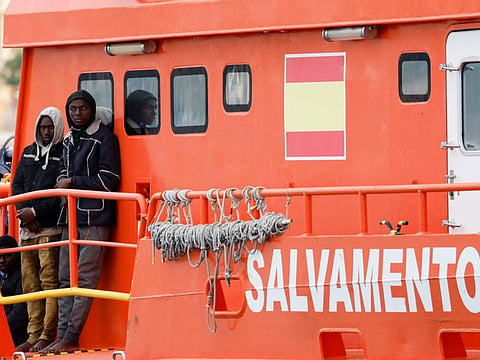Cruise ship rescues 68 migrants off Spain’s Canaries, five dead
Rescuers alerted to vessel drifting in Atlantic some 800km south of island of Tenerife

BARCELONA: A cruise ship rescued 68 migrants from a fishing boat spotted adrift south of Spain’s Canary Islands with five bodies on board, Spanish authorities and the ship’s operator said Thursday.
Rescuers were alerted on Wednesday afternoon to the vessel drifting in the Atlantic some 800 kilometres (500 miles) south of the island of Tenerife.
The cruise ship, the Insignia, was sailing in the area and was called on to head to the boat’s location to pick up the survivors, Spain’s maritime rescue service said in a statement.
It took on board 68 sub-Saharan African migrants, including three women and three minors, and recovered three bodies from the fishing boat. However, “bad weather” prevented it from collecting the other two bodies, the statement said.
The migrant boat was left adrift with a locating device to make it easier for rescuers to find it, the maritime service said.
The 670-passenger capacity Insignia, owned by Miami-based Oceania Cruises, is currently on a 180-day trip around the world which began in January.
It is expected to reach Tenerife on Friday morning.
An Oceania Cruises spokesperson said the 68 migrants were brought “onboard for medical assistance and provided food, drinks, clothing and a safe place to rest.”
“We have coordinated next steps with authorities in Tenerife, and they will be taking over the care of the rescued people. Safety of life at sea is of paramount importance for all seafarers,” the spokesperson added in a statement.
Spain is one of the main gateways for migrants seeking a better life in Europe, with the vast majority making the perilous journey to try and reach the Canary Islands which lie off the northwestern coast of Africa.
Further south
The Atlantic route is particularly dangerous due to strong currents, with migrants travelling in overloaded, often unseaworthy, boats without enough drinking water.
But it has grown in popularity due to increased vigilance in the Mediterranean.
At their closest point, the islands lie 100 kilometres (60 miles) off the coast of North Africa.
But many boats - often long wooden vessels known as pirogues - leave from much further away, setting sail from Morocco, Western Sahara and Mauritania.
Increasingly they are coming from countries further south such as Gambia and Senegal which lie about 1,500 kilometres (about 1,000 miles) from the Spanish islands.
More than 5,000 migrants died while trying to reach Spain by sea in the first five months of this year, or the equivalent of 33 deaths per day, according to Caminando Fronteras, a Spanish charity.
That is the highest daily number of deaths since it began collating figures in 2007.
The vast majority were on the Atlantic route, where 4,800 migrants died while trying to reach the Canaries, the charity said.



